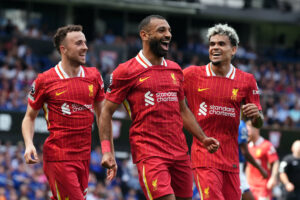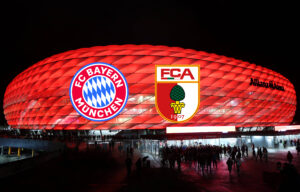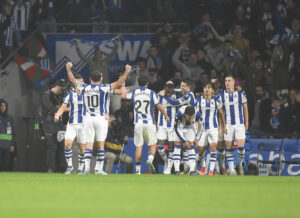Spain looks ready to dominate international football once again after a disappointing World Cup performance in 2014 in Brazil. La Furia Roja exhibited complete dominance in their UEFA qualifying group, earning 28 out of a possible 30 points in ten matches. They also scored 36 goals while only conceding three, leading to an astounding goal difference of 33.
La Liga Santander in Spain has quickly risen up to be arguably the top league in Europe, showcasing spectacular teams. To put the league’s dominance in perspective, the last four Champions League finals have been won by Spanish teams. Although investment in foreign players and coaches has definitely been a part of this, the rise and development of Spanish youth players through the league has been well-documented. With a brimming pool of talent, who will make up Spain’s starting squad in their bid to win a second World Cup?
Spain’s World Cup Starting Eleven
Goalkeeper
The top nations in world football typically have an established man in between the sticks. Spain is no different with David De Gea. In fact, many would argue that De Gea has surpassed Germany’s Manuel Neuer as the top goalkeeper in football.
Spain has a slightly more experienced goalkeeper in Pepe Reina and young talents in Kepa Arizzabalaga and Sergio Rico, but there is no doubt in manager Julen Lopetegui’s mind that De Gea will be the starter. De Gea is on pace to have his best season to date with 11 clean sheets in 15 matches. In addition to this, he’s only conceded five goals thus far for Manchester United. He will definitely be looking to bring that form with him to Russia next summer.
Defence
Only conceding three goals throughout an entire qualification process is not a fluke. Spain has absolutely no reason or intention to make any changes to their dominant defence.
Full-backs
Jordi Alba is one of the outstanding left-backs in football. Plying his trade for FC Barcelona, he also has plenty of experience on the international level with 56 appearances at 28 years of age. He’s one of the quickest defenders in the game and provides a lot going forward. His ability to keep possession and whip in accurate crosses is renowned. Alba can sometimes get exposed during aerial duels due to his lack of height, but the positives definitely outweigh the negatives.
Dani Carvajal is still recovering from a heart condition, but currently, it doesn’t seem like his spot in the tournament is threatened. The Spaniard has broken out as one of the best right-backs in the world, if not the best, and this can be easily seen in just how valued he is by his club Real Madrid.
It is quite hard to find a weakness in Carvajal’s game – he’s quick, agile, solid in possession, an accurate passer, and has terrific defensive awareness and tackling ability. Carvajal does have an issue with discipline, however. He tends to get booked more often than other defenders. This is the only aspect he must work on as one too many slide tackles may see him suspended for a vital game.
Centre-backs
Sergio Ramos and Gerard Piqué will feature in the middle of the defence as the centre-back pairing. Although they have a rivalry at the club level, they’ve consistently started together for the national team for the past several years. Furthermore, Ramos is the captain and emotional leader of this team, and rest assured he will make sure the team does not falter as this could quite possibly be his last World Cup. Piqué has had his fair share of criticism from his Spanish supporters lately due to his comments on Catalonia and their political campaign for independence, but solely focusing on football the centre-back is one of the best Spain can offer.
Spain has plenty of other strong defensive depth options as well. These include César Azplicueta, Marc Barta, and Javi Martínez. Barring any injuries, Spain will still, as they should, stick with what has worked best.
Midfield
The midfield is where choices really get interesting. Spain’s depth in this position is quite astonishing, actually. A legitimate argument can be made for nine or ten different midfielders to have a starting position.
Sergio Busquets is almost guaranteed a starting spot. He’s been arguably the most valuable defensive midfielder in football for the past several years. The midfielder has been a mainstay in FC Barcelona’s midfield and has already hit 100 appearances with Spain before hitting the age of 30. Busquets tends to finish games as the most accurate passer and is a nightmare for opposing midfielders to try to get past.
Assuming Spain uses a formation with three midfielders, the next two selections become quite difficult. Everything considered, Thiago Alcantara and Saúl Ñiguez should start. Thiago has quickly become a world-class midfielder during his time with Bayern Munich and is a jack-of-all-trades. From completing nearly all passes and dribbles to contributing defensively, Thiago does it all. Saúl has yet to break out with Spain, but he is consistently one of the top performers for Atleticó Madrid. He’s got a terrifying shot from distance, but he is most known for his stamina and defensive effort. This will be extremely valuable if and when Spain matches up with the Germany’s and Brazil’s of world football.
Although they still remain very talented, popular but ageing names like Andrés Iniesta and David Silva were left out. They will definitely make the team as impact substitutions, but the energy of the Spanish youth will be vital. Opting for experienced but young players is necessary to withstand a gruelling one-month tournament.
Wingers
Spain must deploy both Marco Asensio and Isco on the wing. Asensio and Isco are both regulars for Real Madrid and have exploded onto the scene as of late. Whether it be Asensio’s rocket of a left foot or Isco’s mind-blowing skills and passing ability, the two Spaniards continue to impress. The two have great chemistry together, and are the ideal pairing to surround any competent striker.
Spain will also have other compelling options such as José Calléjon, Pedro, and Suso. These are bona fide stars, but they would be better suited as depth options for now.
Striker
Besides being one of the finest finishers in world football, Álvaro Morata is also very talented on the ball. This would, in turn, create scoring chances for the two wingers aside him as well. Morata already has chemistry with the other forwards as he is a former Real Madrid man himself. He has blossomed this season, however, after his move to Chelsea in the English Premier League. With seven goals and three assists in only nine matches, Morata is now considered an elite striker. The mix of creativity, explosiveness, and youth in this front line is most definitely a formula for success.
Diego Costa could create chatter about becoming the starting striker if he manages to revitalize his career with Atleticó Madrid. Costa has featured in a World Cup before, but Morata’s scintillating form has shown no signs of slowing down.
Main Photo






